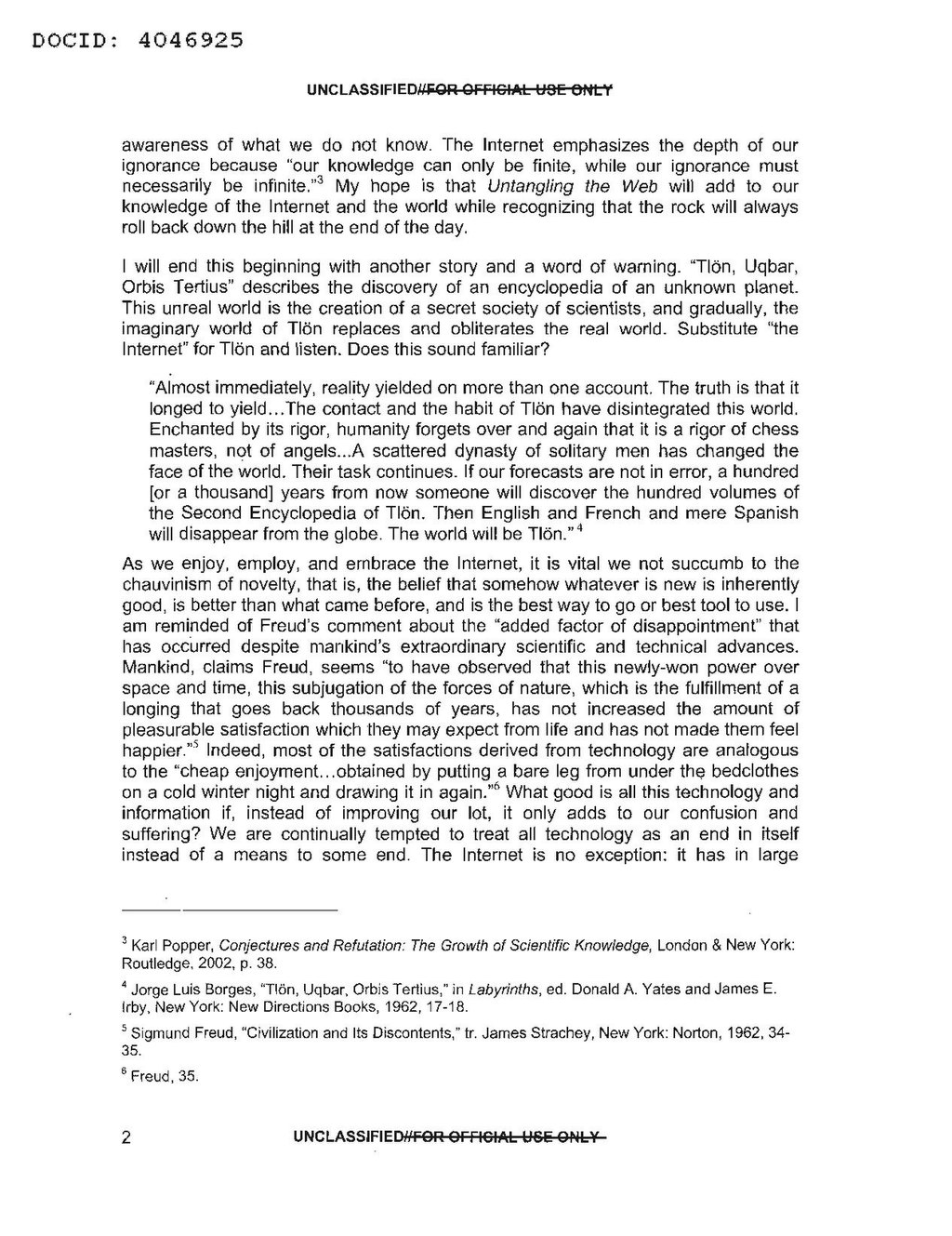DOCID: 4046925
UNCLASSIFIED//FOR OFFICIAL USE ONLY
awareness of what we do not know. The Internet emphasizes the depth of our ignorance because "our knowledge can only be finite, while our ignorance must necessarily be Infinite."[1] My hope is that Untangling the Web will add to our knowledge of the Internet and the world while recognizing that the rock will always roll back down the hill at the end of the day.
I will end this beginning with another story and a word of warning. "Tlön, Uqbar, Orbis Tertius" describes the discovery of an encyclopedia of an unknown planet. This unreal world is the creation of a secret society of scientists, and gradually, the imaginary world of Tlön replaces and obliterates the real world. Substitute "the Internet" for Tlön and listen. Does this sound familiar?
"Almost immediately, reality yielded on more than one account. The truth is that it longed to yield…The contact and the habit of Tlön have disintegrated this world. Enchanted by its rigor, humanity forgets over and again that it is a rigor of chess masters, not of angels…A scattered dynasty of solitary men has changed the face of the world. Their task continues. If our forecasts are not in error, a hundred [or a thousand] years from now someone will discover the hundred volumes of the Second Encyclopedia of Tlön, Then English and French and mere Spanish will disappear from the globe. The world will be Tlön."[2]
As we enjoy, employ, and embrace the Internet, it is vital we not succumb to the chauvinism of novelty, that is, the belief that somehow whatever is new is inherently good, is better than what came before, and is the best way to go or best tool to use. I am reminded of Freud's comment about the "added factor of disappointment" that has occurred despite mankind's extraordinary scientific and technical advances. Mankind, claims Freud, seems "to have observed that this newly-won power over space and time, this subjugation of the forces of nature, which is the fulfillment of a longing that goes back thousands of years, has not increased the amount of pleasurable satisfaction which they may expect from life and has not made them feel
happier."[3] Indeed, most of the satisfactions derived from technology are analogous to the "cheap enjoyment…obtained by putting a bare leg from under the bedclothes on a cold winter night and drawing it in aqain."[4] What good is all this technology and information if, instead of improving our lot, it only adds to our confusion and suffering? We are continually tempted to treat all technology as an end in itself instead of a means to some end. The Internet is no exception: it has in large
- ↑ Karl Popper, Conjectures and Refutation: The Growth of Scientific Knowledge, London & New York: Routledge, 2002, p. 38.
- ↑ Jorge Luis Borges, "Tlön, Uqbar, Orbis Tertius," in Labyrinths, ed. Donald A. Yates and James E. Irby, New York: New Directions Books, 1962, 17-18.
- ↑ Sigmund Freud, "Civilization and Its Discontents," tr. James Strachey, New York: Norton, 1962,34-35.
- ↑ Freud, 35.
